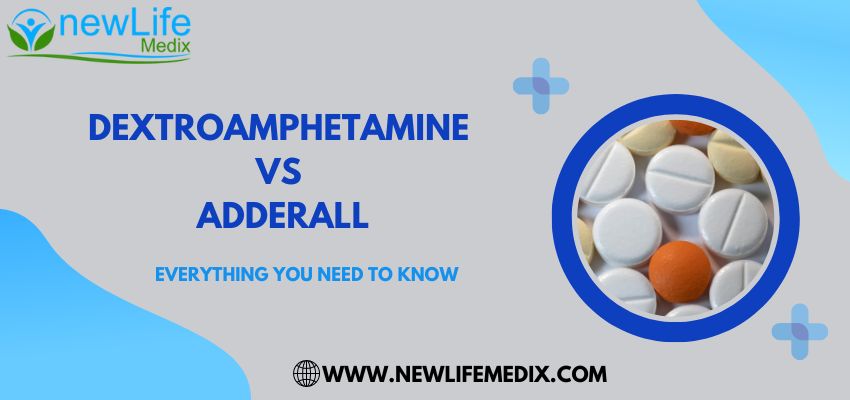Dextroamphetamine and Adderall both belong to the brand names of the two most widely prescribed stimulant medications used to treat Attention Deficit Hyperactivity Disorder also known as ADHD. Both medications contain various kinds of amphetamine, a synthetic substance that stimulates the central nervous system to change the signals of the brain. Compared to Methylphenidate, these medications are more stimulating. Though used for the same purpose, the differences of Dextroamphetamine vs Adderall are very palpable.
Dextroamphetamine vs Adderall: Introduction
Dextroamphetamine is the trade name of the substance Dexedrine. This amphetamine-related drug is typically administered to treat narcolepsy or sleep disorders like ADHD. This medication can help individuals with ADHD focus and remain calm. This drug has the potential for addiction if abused.
Adderall includes Dextroamphetamine Saccharate, Amphetamine Aspartate, Dextroamphetamine Sulfate, and Amphetamine Sulfate. Adderall was approved in 1996. Both Dextroamphetamine and Adderall are approved for ADHD, and Adderall is also approved to treat narcolepsy.
Differences between Dextroamphetamine and Adderall:
- Dextroamphetamine in the immediate-release form is available as tablets and solution whereas Adderall is available as tablets only.
- Dexedrine standard dosages of 5mg are once or twice daily titrated up to 40mg/day. Whereas the Adderall dosage is 5mg once or twice daily titrated up to 60mg/day.
- The generic name of the Dexedrine is Dextroamphetamine Sulfate whereas the generic name of Adderall is Amphetamine Salts.
Side effects: Dextroamphetamine vs Adderall
Common side effects of Dextroamphetamine:
- Fast heartbeat
- Loss of appetite
- Stomach upset
- Dry mouth
- Dizziness
- Headache
- Tremors
- Trouble sleeping
The risky side effects that are frequent in those who misuse this drug include:
- Racing heartbeat
- Chest pain
- Shortness of breath
- Slowed speech and difficulty speaking
- Feeling very tired
- Dizziness or fainting
- Feeling numbness or weakness in the arms or legs
- Changes to vision
Some Common side effects of Adderall:
- Upset stomach
- Lower appetite
- Weight loss
- Nervousness
- Changes in mood
- Trouble sleeping
There are some more serious side effects associated with Adderall, however, they are more common in individuals who abuse the medication. Emergency medical services should be contacted right away if someone suffers any of the following negative effects:
- Vision changes
- Chest pain
- Rapid heartbeat
- Arrhythmias
- Difficulty breathing
- Weakness or numbness in the body
- Skin rash
- Swelling in the face, tongue, or body
- Trouble swallowing
Warnings of Dextroamphetamine and Adderall:
Some Warnings of Dextroamphetamine:
- Misuse and dependence
- Serious heart-related problems
- Aggressive behavior and psychosis
- Slowed growth in children
- Seizures
- Blood circulation problems
- Serotonin syndrome
- Interaction with other medications
Some Warnings of Adderall:
- Misuse and dependence
- Serious heart problems
- Aggressive behavior and psychosis
- Slowed growth in children
- Seizures
- Blood CIrculation problems
- Serotonin syndrome
- Drugs Interactions
Is Dextroamphetamine stronger than Adderall?
Dextroamphetamine has a stronger side effect than Adderall, which also contains Amphetamine. It is the strongest stimulant ingredient, so having amphetamine in the foundation of Adderall makes it weaker as compared to dextroamphetamine.
Dextroamphetamine can be prescribed in the following dosages: 5mg, 10mg, and 15mg. They last up to 8 hours. The dosages can also go all the way up to 40mg if the symptoms are hard to treat. The dosage for Adderall for immediate release comes in 5mg, 7.5mg, 10mg, 1.25mg, and 30mg tablets. The extended-release version of Adderall comes in 5mg increments, ranging from 5mg to 30mg.
Drug interactions of the Dextroamphetamine vs. Adderall:
Dextroamphetamine and Adderall are used concurrently with serotonergic drugs, which may increase the incidence of Serotonin Syndrome. The patient may experience this syndrome, which can leave them feeling agitated, lightheaded, and with a faster heartbeat. This combination with dexedrine or Adderall may be brought on by common antidepressants including selective Serotonin reuptake inhibitors and selective norepinephrine reuptake inhibitors, as well as the analgesic Tramadol.
Conclusion:
Dextroamphetamine and Adderall may very well be used for the treatment of ADHD. However, the functioning of the medicines and the way they compromise the chemicals in the brain are very different. In this blog on Dextroamphetamine vs. Adderall, we have covered all the aspects of the medications to help you choose the correct option among the two.
Related Blogs:
Focalin vs Adderall: A 2023 Thorough Guide

